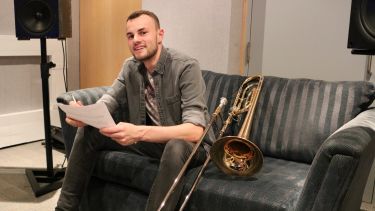- Bipolar Disorder
- Therapy Center
- When To See a Therapist
- Types of Therapy
- Best Online Therapy
- Best Couples Therapy
- Managing Stress
- Sleep and Dreaming
- Understanding Emotions
- Self-Improvement
- Healthy Relationships
- Student Resources
- Personality Types
- Guided Meditations
- Verywell Mind Insights
- 2024 Verywell Mind 25
- Mental Health in the Classroom
- Editorial Process
- Meet Our Review Board
- Crisis Support

How to Design a Music and Personality Experiment
Kendra Cherry, MS, is a psychosocial rehabilitation specialist, psychology educator, and author of the "Everything Psychology Book."
:max_bytes(150000):strip_icc():format(webp)/IMG_9791-89504ab694d54b66bbd72cb84ffb860e.jpg)
Emily Swaim is a board-certified science editor who has worked with top digital publishing brands like Voices for Biodiversity, Study.com, GoodTherapy, and Vox.
:max_bytes(150000):strip_icc():format(webp)/Emily-Swaim-1000-0f3197de18f74329aeffb690a177160c.jpg)
At a Glance
A great social experiment idea for students in psychology is exploring how music and personality could be linked. Here are some tips on doing a psychology experiment with music.
Does your taste in music reveal information about your personality? Some researchers have found that people who prefer certain styles of music tend to have specific personality traits . However, other studies have not found links between music preferences and personality, so there is still a lot left to learn from doing such studies.
Exploring the connection between musical tastes and personality traits could be a great topic for your own research. Here’s how to set up a psychological experiment on music and personality.
Getting Started
Before you start any psychology experiment , discuss your project with your instructor. You may need to get permission from your school's Institutional Review Board before you can proceed.
Once you get the go-ahead, you'll need to narrow your focus to a specific research question and develop a hypothesis. Then, you can begin the process of developing materials and procedures as well as selecting your study participants.
Key Terms and Definitions
These psychology concepts will be important to know as you’re planning your psychology experiment:
- Operational definitions : This includes the procedures, techniques, or methods you will use to change variables in your study.
- Independent variable : This is the variable in your study that you will change.
- Dependent variable : This is the variable in your study that you will observe to see if it is affected by the independent variable. You may have more than one dependent variable.
Possible Research Questions
- Are fast-paced styles of music (such as dance and pop) linked to specific personality traits (such as extroversion and high self-esteem )?
- Are people who like complex musical styles (such as classical) more creative?
- Are people who prefer intense musical styles (such as heavy metal) more assertive?
- Are people who prefer emotional music (like instrumental soundtracks) more reflective?
Develop Your Hypothesis
Once you've picked a research question, the next step is to come up with a hypothesis.
Your hypothesis is a specific statement that explains what you predict you will find out in your experiment. For example, your hypothesis for your music and personality study could be that:
- Participants who prefer jazz and classical music will score higher on tests of creativity.
- Participants who prefer fast-paced musical styles will score higher on measures of extraversion.
Planning Your Experiment
You need to carefully plan the steps and procedures you will use in your experiment. There are some key practical questions that you have to answer before you can get started.
First, where will you find participants? You could ask your fellow classmates or seek out volunteers in your school or community.
Next, what materials and tools will you need to collect data on musical preferences and personality? You may need music, headphones, and devices for listening.
How will you assess each participant's musical tastes? The easiest method would be to use a simple questionnaire. You can ask participants to rate different musical styles on a scale from one to 10, with one being least preferred and 10 being most preferred.
You also need to determine how you will measure personality. Are you going to look at specific personality traits, such as emotional stability or extroversion? There are different ways you can approach this experiment, so the choice is up to you. For example, you might choose to look at a single personality dimension, like extraversion or introversion .
What questions did you decide to explore in your study? Maybe, "Do introverts tend to prefer a specific style of music?" Or, "Are extroverts drawn to faster-paced musical styles?"
You may choose to look at music tastes within the Big Five personality dimensions. Instead of having to come up with a questionnaire, you could have your participants do an existing assessment such as the Ten Item Personality Measure (TIPI).
Collect Data and Analyze Your Results
Once you have collected all the data for your experiment, it is time to analyze your results.
Did you find any evidence to support your hypothesis? Were the results of your experiment statistically significant?
After performing your analysis, you’ll need to report your results according to the format that your instructor has assigned. For example, you may need to write a psychology lab report or create a bulletin board presentation.
Examples of Music and Personality Studies
Here are a few studies on music and personality that could serve as inspiration or references as you create your own:
- Greenberg DM, Wride SJ, Snowden DA, Spathis D, Potter J, Rentfrow PJ. Universals and variations in musical preferences: A study of preferential reactions to Western music in 53 countries . J Pers Soc Psychol . 2022;122(2):286-309. doi:10.1037/pspp0000397
- Anderson I. “Just the Way You Are”: Linking music listening on spotify and personality . Social Psychological and Personality Science . 2021. doi:10.1177/1948550620923228
- Ewelina Sielska-Badurek, Sobol M, Katarzyna Okulicz-Kozaryn, Paweł Gołda, Cielecka A. Personality traits in singers performing various music styles and with different singing status . International Journal of Occupational Medicine and Environmental Health . Published online September 25, 2023. doi:10.13075/ijomeh.1896.02099
- Ignacio J. Exploring relations between Big Five personality traits and musical emotions embodied in spontaneous dance . Psychology of Music . 2023. doi:10.1177/03057356221135355
- Qiu L, Chen J, Ramsay JE, Lu J. Personality predicts words in favorite songs . Journal of Research in Personality . 2019;78:25-35. doi:10.1016/j.jrp.2018.11.004
Devenport SP, North AC. Predicting musical taste: relationships with personality aspects and political orientation . Psychol Music . 2019;47(6):834-847. doi:10.1177/2F0305735619864647
University of Cambridge. Musical preferences unite personalities across the globe .
APA. Institutional review board .
APA. Informed consent .
APA. Operational definitions .
APA. Independent variable .
APA. Dependent variable .
APA. Hypothesis .
Goz Lab. Ten-item personality measure .
By Kendra Cherry, MSEd Kendra Cherry, MS, is a psychosocial rehabilitation specialist, psychology educator, and author of the "Everything Psychology Book."

- Department of Music
- Research themes
Psychology of Music

Research in the Psychology of Music uses psychological theories and methods to interpret and understand musical sounds, musical behaviours, and the effects of music. The subject is strongly inter-disciplinary, and generally combines empirical data collection, through observation, experiments, surveys or otherwise, with theoretical innovation. The scope of research in Sheffield ranges from fundamental questions related to music perception and cognition to applications of music psychology in everyday life. The breadth of research is reflected in its three main research units – Music, Mind, Machine in Sheffield, Music & Wellbeing, and Sheffield Performer & Audience Research Centre.
The University of Sheffield has the longest established and biggest grouping of music psychology expertise in the UK. In any single year we have around 12 research students working on psychology of music or music education projects, over 30 students on our three taught MA programmes, and a number of research assistants and post-doctoral scholars. We have strong links with the Department of Psychology and other cognate departments, through joint supervision of postgraduate and undergraduate research projects, and through research collaborations between staff.
Psychology of Music is an active research area and has seen considerable growth in the UK in recent years. Sheffield is an important contributor to the area both at a national and international level through research networks and collaborations, participation in and organisation of international conferences and events, contributions to the international research literature, and by educating music psychologists who come from across the world. These connections benefit staff and students and ensure that research and teaching are conducted at the highest internationally competitive level.
I think one of the best things about studying music psychology at the University of Sheffield is feeling surrounded by a community of lecturers and fellow students who are passionate about this topic. This sense of community, along with the specialised facilities to carry out my research, always made me feel that my research interests and initiatives were supported, and they made my time as a PhD student not only academically productive, but very enjoyable. Julian Cespedes PhD researcher
Examples of funded research projects
- Music in the workplace (AHRC)
- Teaching and learning of expressive music performance (AHRC)
- Music perception in hearing impaired listeners (WRoCAH)
- Dropping in and dropping out – exploring experiences of lapsed and partial arts engagement (AHRC)
- Earworms (tunes that stick in our heads) as we age (British Academy)
- Demystifying music review (Swiss National Science Foundation)
- Music to support sleep (Experimental Psychological Society)
- Space and embodiment in headphone listening (WRoCAH)
- Cross-modal perception of music (British Academy)
- Expressive nonverbal communication in ensemble performance (WRoCAH Network)
Related courses
Music psychology in education, performance and wellbeing ma.
- August 2025 start
- 2 years Part-time Distance learning Online learning
Learn about psychological research on musical experiences on this distance-learning course, including learning, teaching, practicing, performing, listening and using music to enhance well-being.
- Funding available
Psychology of Music MA
- September 2025 start
- 1 year 2 years Full-time Part-time
Explore fundamental questions about music and its central place in our lives on the longest established music psychology programme in the UK. Our interdisciplinary approach offers a unique perspective on music and rigorous training in research techniques.
Academic staff
Dr michael bonshor.


Professor Nicola Dibben

Dr Caroline Curwen

Professor Stephanie Pitts

Professor Renee Timmers

Related to Psychology of Music
More research themes
Muses Mind Machine Research Centre
Sheffield Performer and Audience Research Centre
A masters from Sheffield means in-depth knowledge, advanced skills and the confidence to achieve your ambitions.
The Experimental Psychology’s Use of Music to Uncover Mental Capabilities
- First Online: 11 June 2022
Cite this chapter

- Sven Hroar Klempe 3
Part of the book series: Palgrave Studies in Sound ((PASTS))
250 Accesses
It was the experimental psychologist G. T. Fechner who defined music as “the direct factor”. This chapter demonstrates how experimental psychology reveals different aspects of the human mind by means of musical stimuli. Wilhelm Wundt wrote a brief introduction to psychology based on the metronome. Carl Stumpf’s Tonpsychologie from the 1880s concluded that both consonance and dissonance are relative and this became the main argument for being able to discuss gestalts. Christian von Ehrenfels presented Gestalt psychology’s decisive argument by referring to the transposition of a melody. Thus, one of the most important findings in this chapter is that we manage to relate to several pieces of information at the same time. This is evident through the music’s harmonies and polyphonic aspects.
This is a preview of subscription content, log in via an institution to check access.
Access this chapter
Subscribe and save.
- Get 10 units per month
- Download Article/Chapter or eBook
- 1 Unit = 1 Article or 1 Chapter
- Cancel anytime
- Available as PDF
- Read on any device
- Instant download
- Own it forever
- Available as EPUB and PDF
- Compact, lightweight edition
- Dispatched in 3 to 5 business days
- Free shipping worldwide - see info
- Durable hardcover edition
Tax calculation will be finalised at checkout
Purchases are for personal use only
Institutional subscriptions
Arom, S. (1991). African polyphony & polyrhythm. Musical structure and methodology (M. Thom, B. Tucket, & R. Boyd, trans.). Cambridge University Press.
Google Scholar
Bakhtin, M. (1984). Problems of Dostoevsky’s poetics (C. Emerson, trans.). University of Minnesota Press.
Baron, M. E. (1969). The origins of the infinitesimal calculus . Pergamon Press.
Blacking, J. (1973/1976). How musical is man? University of Washington Press.
Chanan, M. (1994). Musica Practica. The social practice of Western music from Gregorian chant to postmodernism . Verso.
Dahlhaus, C. (1989). Die Musiktheorie im 18. Und 19. Jahrhundert, Zweiter Teil: Deutschland. Geschichte der Musiktheorie, Band 11 . Wissenschaftliche Buchgesellschaft.
Davis, W. L. (2003). Better a witty fool than a foolish wit: The art of Shakespeare’s chiasmus. Text and Performance Quarterly, 23 (4), 311–330.
Article Google Scholar
Deutsch, D., Henthorn, T., Marvin, E., & Xu, H. (2006). Absolute pitch among American and Chinese conservatory students: Prevalence differences, and evidence for a speech-related critical period. Journal of the Acoustical Society of America, 119 (2), 719–722.
Eriksen, I. H. (2018). Mer enn bare en tone—En kvalitativ undersøkelse om oppfatningene av tonedøvhet i Norge og på Filippinene [More than tones—A qualitative investigation of the understanding of amusia, Norway and Philippines Compared] . Master thesis in psychology, NTNU, Trondheim.
Gabrielson, A. (2008). Starka musikupplevelser. Musik är mycket mer än bara musik . Gidlunds förlag.
Helmholtz, H. L. F. (1954). Sensations of tone, as a physiological basis for the theory of music . Dover.
Hobberstad, L. (2002). Absolutt gehør: ei undersøking av klangfargen si rolle [Perfect pitch: A study on the impact of timbre] . Master thesis in psychology, NTNU, Trondheim.
Husserl, E. (2001). Logical investigations, volume 1 . Routledge.
Jackendoff, R., & Lerdahl, F. (2006). The capacity for music: What is it, and what’s special about it? Cognition, 100 (2006), 33–72.
Leibniz, G. W. (1666). Dissertation on the art of combinations (selections) . https://www.math.ucla.edu/~pak/hidden/papers/Quotes/Leibniz-Arte-Combinatoria.pdf
Lévi-Strauss, C. (1981). The naked man. Introduction to a science of mythology. vol. 4 (J. Weightman & D. Weightman, trans.). Harper & Row.
Mandler, G. (1985). Mind and body. Psychology of emotion and stress . W.W. Norton.
Martinelli, R. (2006). Meinong and music. On musical objects of higher order. In R. Venanzio (Ed.), Meinongian issues in contemporary Italian philosophy, vol. 2 (pp. 39–72). De Gruyter.
Chapter Google Scholar
Marx, A. B. (1857). Allgemine Musiklehre. Ein Hülfsbuch für Lernende in jedem Zweige musikalischer Unterweisung. Sechste verbesserte Auflage . Breitkopf und Härtel.
Mithen, S. (2005). The singing Neanderthals: The origin of music . Weidenfeld & Nicolson.
Moro, N. (2006). Der musikalische Herbart. Harmonie and Kontrapunkt als Gegenstände der Psychologie und der Ästhetik . Königshausen & Neumann.
Moro, N. (2012). Settings Kant’s ‘transcendental aesthetic’ to music. J. F. Herbart’s and C. Stumpf’s tone psychology . Reprinted summary of “Estetica transcendentale in musica. La psicologia del suono di J.F Herbart e C. Stumpf”. Mimesis.
Peterson, J. (1909). Titchener on Helmholtz’s explanation of combination tones. Psychological Bulletin, 6 (11), 397–399.
Sacks, O. (2007). Musicophilia. Tales of music and the brain . Picador.
Shakespeare, W. (1975). The complete works of William Shakespeare . Spring Books.
Sloboda, J. A. (1985). The musical mind. The cognitive psychology of music . Clarendon Press.
Sloboda, J. A. (2005). Exploring the musical mind. Cognition, emotion, ability, function . Oxford University Press.
Stumpf, C. (1883). Tonpsychologie. Erster Band . Verlag von S. Hirzel.
Stumpf, C. (1890). Tonpsychologie. Zweiter Band . Verlag von S. Hirzel.
Stumpf, C. (1898). Konsonanz und Dissonanz. Beiträge zur Akustik und Musikwissenschaft. 1. Heft . Verlag von Johann Ambrosius Barth.
Stumpf, C. (2012). The origins of music (D. Trippett, ed. and trans.). , Oxford University Press.
Von Ehrenfels, C. (1890/1988). On Gestalt qualities. In B. Smith (Ed.), Foundations of Gestalt theory (pp. 82–117). Philosophia Verlag.
Von Ehrenfels, C. (1932/1988). On Gestalt qualities (1932). In B. Smith (Ed.), Foundations of Gestalt theory (pp. 121–123). Philosophia Verlag.
Wundt, W. (1902). Outlines of psychology (C. H. Judd, trans.). Wilhelm Engelmann.
Wundt, W. (1912). An introduction to psychology (R. Pintner, trans.). The Macmillan Company.
Download references
Author information
Authors and affiliations.
Norwegian University of Science and Tech, Trondheim, Norway
Sven Hroar Klempe
You can also search for this author in PubMed Google Scholar
Corresponding author
Correspondence to Sven Hroar Klempe .
Rights and permissions
Reprints and permissions
Copyright information
© 2022 The Author(s), under exclusive license to Springer Nature Singapore Pte Ltd.
About this chapter
Klempe, S.H. (2022). The Experimental Psychology’s Use of Music to Uncover Mental Capabilities. In: Sound and Reason. Palgrave Studies in Sound. Palgrave Macmillan, Singapore. https://doi.org/10.1007/978-981-19-2340-1_3
Download citation
DOI : https://doi.org/10.1007/978-981-19-2340-1_3
Published : 11 June 2022
Publisher Name : Palgrave Macmillan, Singapore
Print ISBN : 978-981-19-2339-5
Online ISBN : 978-981-19-2340-1
eBook Packages : Social Sciences Social Sciences (R0)
Share this chapter
Anyone you share the following link with will be able to read this content:
Sorry, a shareable link is not currently available for this article.
Provided by the Springer Nature SharedIt content-sharing initiative
- Publish with us
Policies and ethics
- Find a journal
- Track your research

IMAGES
COMMENTS
Explore the psychology of music, how it affects human behavior. Experiment with the effect of characteristics of music on learning, emotions, or motivation . Movie Music
Nov 24, 2023 · A great social experiment idea for students in psychology is exploring how music and personality could be linked. Here are some tips on doing a psychology experiment with music. Does your taste in music reveal information about your personality?
“Music can change the world because it can change people.” — Bono. Pioneering work from the field of positive media psychology has demonstrated that entertainment media experiences could go beyond mere pleasure and enjoyment by providing meaningful insights about life (Oliver & Bartsch, Citation 2010; Oliver & Raney, Citation 2011; Wirth et al., Citation 2012) and giving rise to a desire ...
Music also lights up nearly all of the brain — including the hippocampus and amygdala, which activate emotional responses to music through memory; the limbic system, which governs pleasure, motivation, and reward; and the body’s motor system. This is why “it’s easy to tap your feet or clap your hands to musical rhythms,” says Andrew ...
Music in Psychology - science fair projects and experiments: topics, ideas, resources, and sample projects.
Half the students will take test A while listening to classical music and test B with no background music. The other half of the students will take test B while listening to classical music and test A with no background music. Analyze the scores to see if there are differences in performance between the music and non-music conditions.
Research in the Psychology of Music uses psychological theories and methods to interpret and understand musical sounds, musical behaviours, and the effects of music. The subject is strongly inter-disciplinary, and generally combines empirical data collection, through observation, experiments, surveys or otherwise, with theoretical innovation.
Jun 11, 2022 · It was the experimental psychologist G. T. Fechner who defined music as “the direct factor”. This chapter demonstrates how experimental psychology reveals different aspects of the human mind by means of musical stimuli. Wilhelm Wundt wrote a brief...
Psychophysical experiments are research methods that investigate the relationship between physical stimuli and the sensory perceptions they evoke. This type of research is crucial for understanding how auditory information is processed, especially in the context of music and melody. By systematically varying stimulus properties and measuring perceptual responses, these experiments help reveal ...
An experiment is a scientific procedure undertaken to test a hypothesis or to validate a theory by observing the effects of varying certain conditions. In the context of using music as a mnemonic device, experiments often involve manipulating musical elements to see how they influence memory retention and recall.